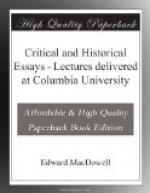EURYDICE—PERI.
Orpheus bewailing his fate.
[Figure 43]
[W: I weep not, I am
not sighing, tho’ thou art from me taken.
What
use to sigh]
Orpheus’ joy in bringing back Eurydice.
[Figure 44]
[W: Gioi-te al canto
mio serve frondo di che in su l’au rora]
[14] It is interesting to note as to the prevalence
of Latin,
that Dante’s “Divina
Commedia” was the first important
poem in Italian.
Latin was used on the stage in Italy
up to the sixteenth
century; the stationary chorus
stationed on the stage
remained until the seventeenth
century and was not
entirely discontinued until the
first half of the eighteenth
century.
XVII
OPERA
No art form is so fleeting and so subject to the dictates of fashion as opera. It has always been the plaything of fashion, and suffers from its changes. To-day the stilted figures of Hasse, Pergolesi, Rameau, and even Gluck, seem as grotesque to us as the wigs and buckles of their contemporaries. To Palestrina’s masses and madrigals, Rameau’s and Couperin’s clavecin pieces, and all of Bach, we can still listen without this sense of incongruity. On the other hand, operas of Alessandro Scarlatti, Matheson, and Porpora would bore us unmitigatedly. They have gone out of fashion. Even the modern successors of these men, Bellini, Donizetti, and Verdi, in his earlier years, have become dead letters musically, although only as late as 1845, Donizetti was at the very zenith of his fame.
Of all the operas of the past century, our present public has not seen or even heard of one, with the exception of “The Magic Flute,” and less probably “Don Juan.” This is bad enough; but if we look at works belonging to the first part of the nineteenth century, we find the same state of affairs. The operas of Spontini, Rossini, most of Meyerbeer’s, even Weber’s “Freischuetz,” have passed away, seemingly never to return. Even “Cavalleria Rusticana,” of recent creation, is falling rapidly into oblivion. Thus the opera comique early disappeared in favour of the romantic opera and the operetta. The former has already nearly ended its career, and the latter has descended to the level of mere farce. In the course of time, these opera forms become more and more evanescent; for the one-act opera of miniature tragedy, which is practically only a few years old, is already almost extinct.
And yet this art form has vastly more hold on the public than other music destined to outlive it. The fact is, that music which is tied down to the conventionalities and moods of its time and place can never appeal but to the particular time and mood which gave it birth. (Incidentally, I may say the same of music having its roots in the other peculiarities of folk song.)




